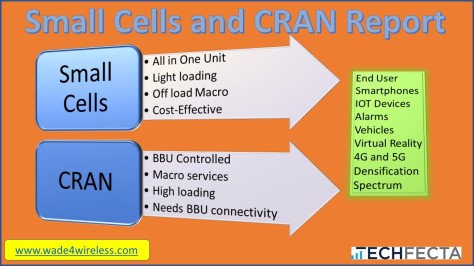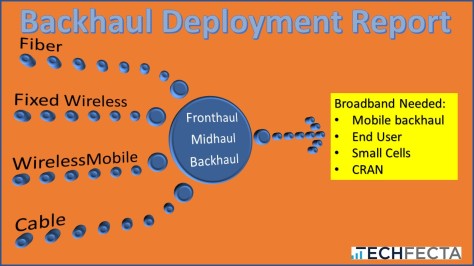Does Wi-Fi need an exit strategy after 5G is released?
This is a legitimate question if 5G does all that they say it does. We already know that 4G will have an exit strategy. We see LTE going away once all carriers convert their systems to 5G, maybe in 2024 or 2025. What about Wi-Fi?
Why am I bringing this up? Because I read an article at the link below, that mentions an exit strategy for Wi-Fi.
It talks about using private LTE as an exit strategy for Wi-Fi. I believe that they are showing that an enterprise can have a license free or better yet a lightly licensed CBRS LTE system. They don’t need to have an open system but something that is licensed, somewhat protected, and efficient. Maybe it’s something that the smartphone can use seamlessly with the carrier’s LTE system.
I think that Ruckus and SpiderCloud are going to push the initiative. Why not, it’s a professional system that is slightly better than Wi-Fi. However, many enterprise love Wi-Fi and they are eager to try the 60GHz spectrum.
I can’t wait to see what happens with Wi-Fi, but 5G should be a game changer, and I truly believe that 5G as license free and lightly licensed will be there next big push. Why wouldn’t it? It makes sense to have 5G in all spectrums. That is the way the OEMs and the carriers were going for LTE. Now that there’s something new they should jump to 5G immediately for all spectrums. One technology will make life so much easier.
Also, Qualcomm would be pleased to have licensing of the 5G NR in everything. They would make so much money! There needs to be some competition for 5G.
I think that 5G is an expectation of all systems. Sprint is rolling out 5G in their new massive MIMO system from the start. Article below.
Sprint knows that 5G is going to take over the world and for the first time in a long time they are making a smart technology decision to move ahead. I am only pointing out the WiMAX and Nextel systems that they had to retire. I would imagine they lost a lot of money on both gambles. Anyway, I digress.
The massive MIMO is something that T-Mobile talked about, and the spectrum that Sprint has in 2.5GHz is perfect to roll out LTE and 5G concurrently. No wonder T-Mobile sees the value in this. They have the 600MHz for rural and the 2.5GHz in urban and suburban areas. They would quickly put AT&T in the dust by just rolling out the new systems. That and the John Legere marketing would force the other two carriers to compete or concede.
Now, let’s look at what Sprint did with the Magicbox, WOW! They seem to have all aspects covered, don’t they?
When they have 5G available, will they care as much about Wi-Fi? Sprint hasn’t played up Wi-Fi as AT&T did. In fact, they didn’t see the value like AT&T. T-Mobile, on the other hand, had great success rolling out the Wi-Fi systems and using Voice over Wi-Fi. However, why don’t they push that as much today? I honestly don’t know, but I would think that they didn’t like it as much as they had hoped. Although, it was very popular.
What technology will survive, 5G, LTE, or Wi-Fi?
So which is it? Which one will be around in the year 2025? Will they all be here? Will we be looking at Wi-Fi and 5G and talking about the demise of LTE? Will we just compare 5G to the next thing?
These should be a consideration to futurist. Today, those questions don’t matter. In fact, all we care about is seeing which 5G system will come out first. We are all hoping to see the first 5G smartphones roll out. Then, I would think we would look for the cost-effective chipsets that could be installed into laptops, tablets, and other devices. Not to mention IOT systems that are super cheap.
I guess I am way ahead of myself. To be honest, we need to get through the 5G lab and FIT, right? I am confident it will happen for both FWA and mobility. They need to be released and GA, (General Availability), before we start talking about how great it is.
5G will stumble, all new technology does. But the 3GPP group will right the wrongs, make the problems disappear as they did for 3G and 4G. They are brilliant people and will make 5G better than anything before. They will have more spectrum than ever to see how far we can push the limits. It’s inspiring.
We all know 5G will survive and at some point, LTE will be sunset. I didn’t think it would happen so fast, but the public is hungry for the new “G,” as well as all the marketing people and the OEMs trying to make money off RAN and small cells. It’s an evolved ecosystem that everyone is feeding off of through 2022. After all, we all have families to feed, right?
When I look at the OEMs and see how they scaled back on LTE-U, it makes me wonder if they have changed course. Will they continue to rely on Wi-Fi for offloading or will they push a 5G license-free format? Could it be they are moving towards LTE-U, but not advertising it? It doesn’t seem that way to me. I don’t even hear Qualcomm pushing MuLTEfire anymore, and there is a MuLTEfire alliance!
I wonder, will Multefire change to a 5G format? Would that be the future so that we can have stood along 5G systems? I think if they want that to happen, they need to start pushing that initiative today or it will start to die as LTE-U did.
If I sound confused, it’s because I am. I mean, what direction are we headed? Will the carriers and OEMs run away from LTE altogether, or do they want to have LTE as the offload technology of choice?
Here is what I do know.
- Not many carriers are looking at unlicensed at this time.
- They are all concentrating on 5G rollouts and how to make LTE last longer.
- They are trying to get VoLTE to be stable and reliable.
- They also want to sunset 3G sooner than later. Maintaining 3 technologies is a nightmare.
- They want to find an IOT model that works and is cost effective.
- They need to find new subscribers and break into new markets.
- They need to boost income and RPU.
I think that covers most of it using today’s standards as a reference.
Evolution is amazing. Remember when having a laptop or even a Kindle with the carriers chip on it made it more valuable. Now we turn on the Wi-Fi hotspot in our smartphones and rely on that to connect the Wi-Fi enabled laptop.
I would say the main reason for that is because indoor coverage is not keeping up with the outdoor coverage. I don’t see the carriers improving it anytime soon.
Who wins?
If looking at technology, who cares, right? This is about who makes money. The licensing fees with 5G and LTE, they win. The OEMs are making the equipment, they win. The carriers sell the service and add new subscribers for new services, they win.
Wi-Fi, the vendors that sell the equipment, they win. People who install the systems, and I mean more than macro sites. Small cell, CRAN, VRAN, DAS, and all the indoor systems, they win. It’s a matter of getting it out to the people.
I don’t see Wi-Fi being sunset for a very long time, in my opinion, it’s already a winner. Why not go with that.
Differentiators:
I am not talking about technologies alone. Sprint and T-Mobile will have massive MIMO and Verizon and AT&T will have FWA. What will the consumer see? What will they experience?
How are the carriers going to differentiate themselves from each other to the consumer? Maybe they can’t! They are trying to differentiate themselves from the cable companies. They will work very hard to make you choose them over the Comcast’s of the world. That’s the new goal. They want to become even more valuable to the end user who wants a mobile device and a high-speed ISP.
Verizon and AT&T already made one move with fiber to the home. Now they are going to make another push with fixed wireless. The more products and services they can get a person to commit to the more that person is liable to stick with them, assuming they treat them right. T-Mobile made sure that customer service and no contracts matter to the end user. The world has changed.
Let me ask you something though. How do they differ from each other? Seriously, if you switch from Verizon to AT&T to T-Mobile, what changes other than coverage? Maybe the price, but how significant is that. Sprint’s last campaign entirely revolved around that one issue. They said, hey, we’re good enough and cheaper, why not go with us. So begins the race to the bottom. Way to go Sprint!
I think of the quote from Seth Godin that states, “How do we know that brands like Verizon and AT&T are essentially worthless? Because if we switched someone from one to the other, they wouldn’t care.” While this is an older quote, it’s more relevant today than ever because what is the difference for mobile coverage?
Ask yourself these questions, then think about the world we live in today:
- Do you remember when Verizon was the monopoly?
- In mobile coverage and in landlines, more or less.
- Do you remember when landlines mattered?
- Do you remember when you picked a carrier based off of coverage?
- Do you remember when you went with a carrier because there was something unique about them?
- Seth Godin’s quote came from one of these blogs; I included both to make the point about Verizon being a monopoly at one time.
The industry has evolved. The carriers are becoming more and more alike. Sprint is in serious financial troubles even though they are running leaner than ever. The cheaper carrier that’s almost as good, say within 1% as good, is struggling to make it until T-Mobile can take over.
Do you know who your carrier is? Of course, you do! It’s the one who gave you the best deal with the best coverage where you need it the most. It was either your decision, or your company had a corporate deal with one of them to save money.
In 5 years, will it matter? What will the differentiator be? Will you decide based off of technology? You might. AT&T had the iPhone exclusively for a year, does it matter now? Will you choose AT&T because they had the iPhone first? Probably not, I mean seriously, who cares today?!?
The choices you make may be personal, perhaps loyalty to a carrier you’ve been with for years. It might be because you were with a carrier whose customer service sucked so bad or they charged you outrageous roaming fees that you swore you would never go back to them. I did that, sorry Sprint, but you really poised me off! How could you do that to me?
Coverage still matters. I can’t tell you how many kids I talked to wanted to go with T-Mobile, but it didn’t work at their house. Why T-Mobile? Because of marketing! The marketing that T-Mobile does focuses almost exclusively on millennials and veterans. T-Mobile is not stupid! They know how to grab attention.
Sprint did something similar by getting the brilliant Paul Marcarelli to take Verizon’s tagline, “Can you hear me now” to telling me that Sprint is good enough with a better price. To be honest, it worked very well. Mr. Marcarelli is still doing the commercials. Let’s face it; he’s a likable character.
What’s next for Wireless Carriers?
Obviously 5G, but now that means more than just a new G, unlike 3G and 4G. It now means that FWA is going to be a reality with the new spectrum. It means that mobile coverage has the potential to rival your ISP if you live within coverage. It means that IOT may become mainstream and affordable to all companies.
The idea of 5G should open up new offerings that the carriers can sell and compete in new industries.
Think of this; TV will change, it already has. Cable is dying, and internet TV in the form of subscriptions services is rising. Even if they use their TV, how many people rely on the Amazon Fire Stick or Apple TV, it’s an alternative to cable. Think of the millennials, how many watch anything but movies or downloaded shows on any device? Yes, including TVs. They may use Amazon Prime Video or Netflix but either way, it’s not cable.
The world is changing, open up your eyes. The carriers and cable companies need to see this. Comcast is betting heavy on Wi-fi, is that a good bet or will that become obsolete in 2021? Will the carriers create unlimited packages that run from your smartphone to the laptop on LTE or 5G? If you think it’s not possible, think about how Amazon will let you watch the same show on your Kindle, smartphone, or firestick. Carriers need to offer a similar service where you can have unlimited across several devices, just like they do with family plans on a smartphone, expand that to more than the device. That is the dream!
What’s next for Deployment?
The carriers are going to stop upgrading at some point when the systems are good enough. They won’t densify unless they can get a clear payback. They are already reducing all costs, specifically contractor costs, to keep profits high enough for the shareholders to be happy. They are all downsizing.
Is DAS going to continue to take off? Of course, just maybe more of a CRAN distribution.
Indoor needs to get better, but is that through Wi-Fi or LTE or 5G? What is it that will be the foundation for seamless coverage as well as new private wireless systems for new services? Do you really care who’s system you’re on or what price you pay?
It’s not all doom and gloom. There is a light at the end of the tunnel. Hopefully, it’s not a train coming at us but new services. If the carriers can continue to innovate, like offering an alternative to the cable company as a low-cost ISP. Lucky for them cable TV packages are not so valuable anymore. Think about how many people watch shows, YouTube, Sports, and more on their devices. whether it’s a smartphone, laptop, iPad, or Kindle, they watch more and more on devices.
Will device makers get to have more of a say in the future or will they continue to play catch up?
Will Wi-Fi be here in 2025?
I can’t wait to find out! I hope I’m still working in this industry. Well, maybe not.
Be smart, be safe, and pay attention!
See Ya!
More products from TechFecta and Wade4Wireless that support WADE!









